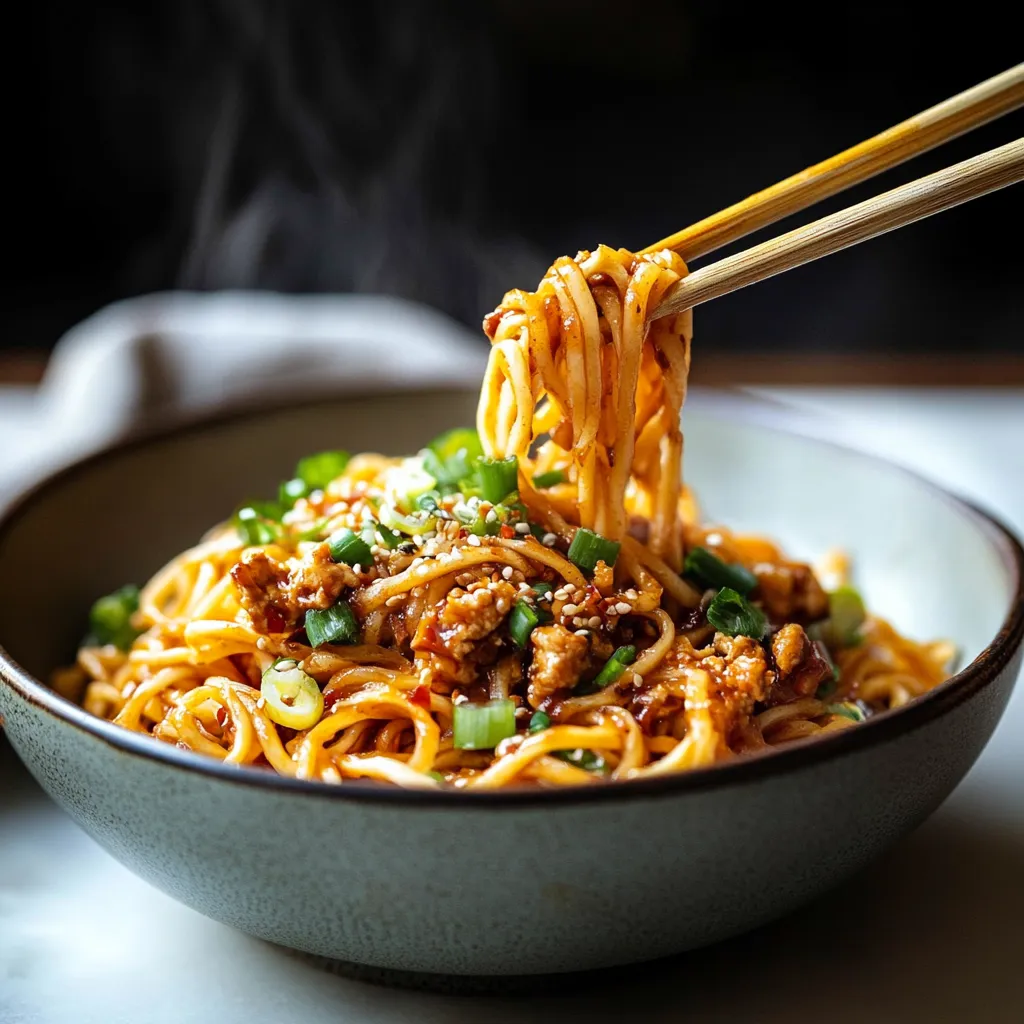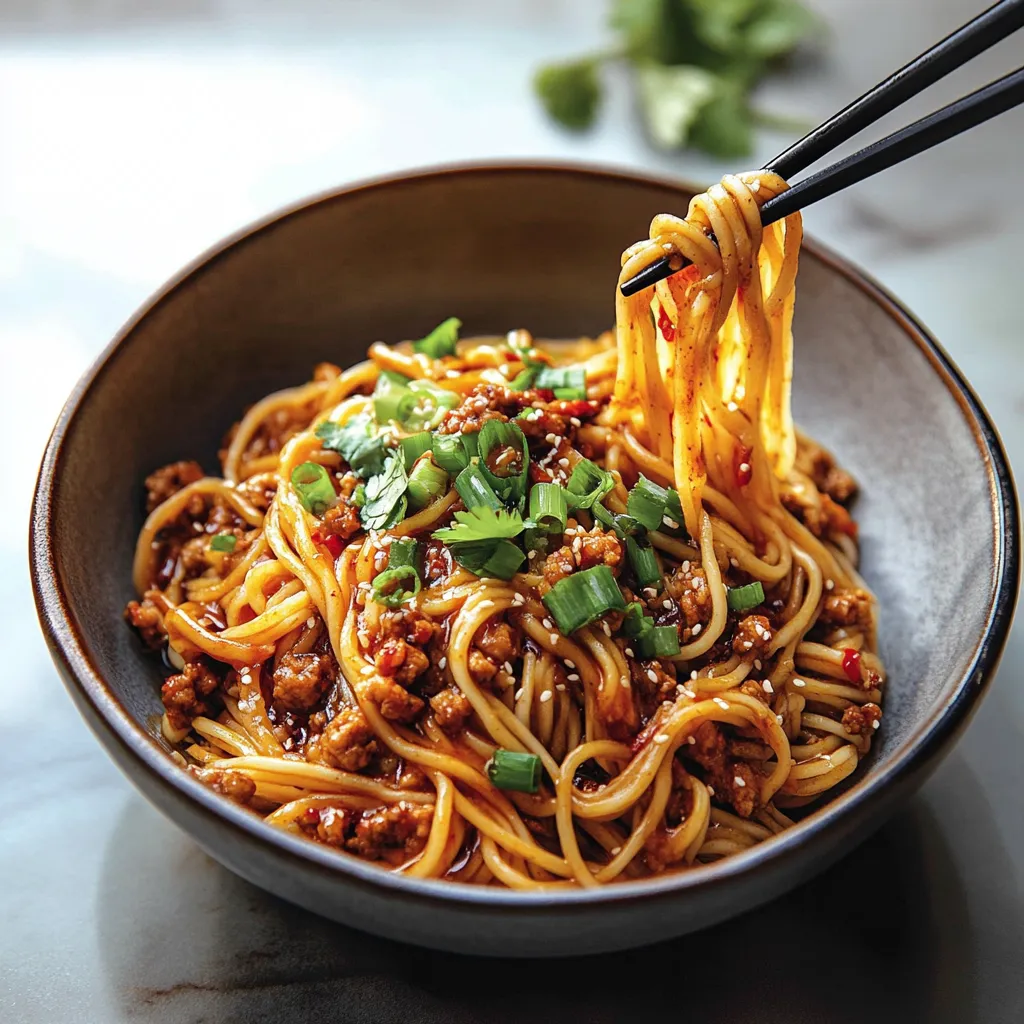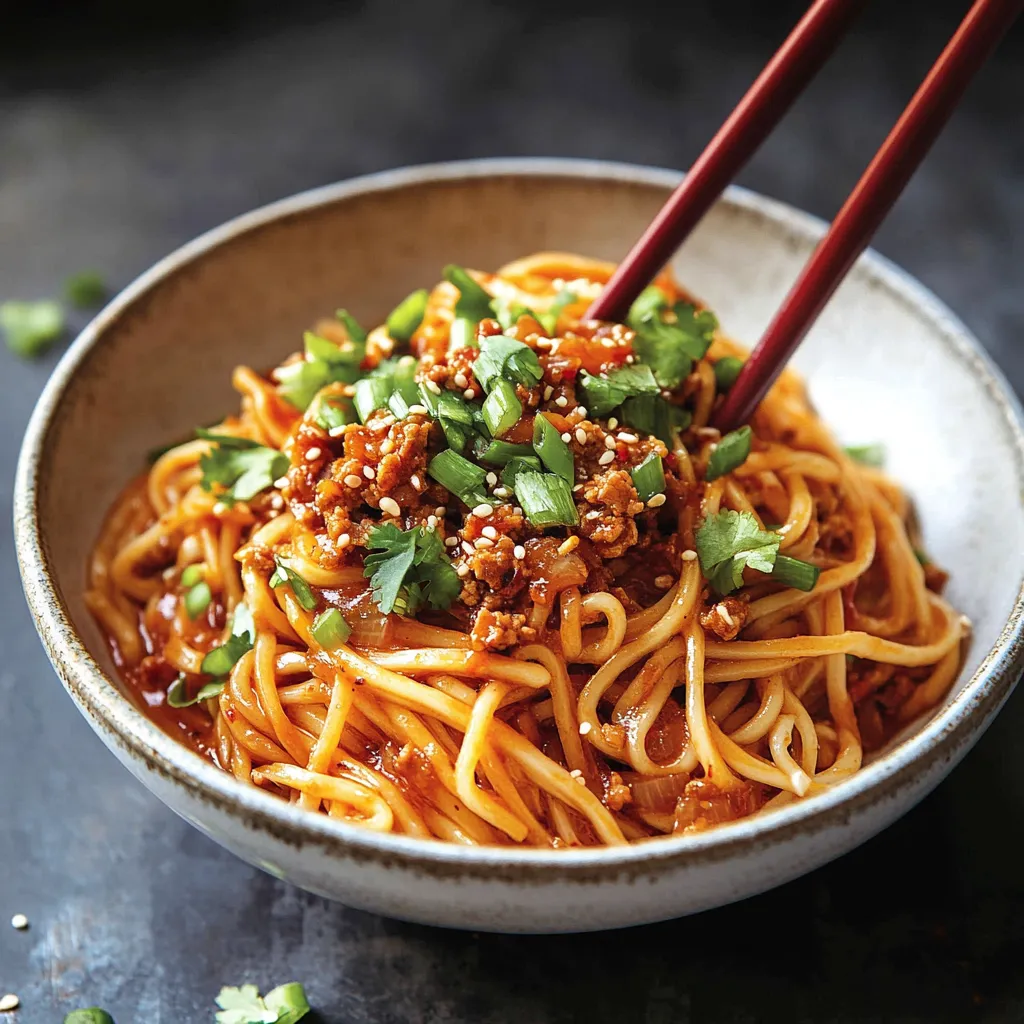 Pin it
Pin it
This spicy Szechuan noodle dish transforms simple ingredients into an authentic Chinese meal that rivals your favorite takeout but comes together in just 30 minutes. Perfect for busy weeknights when you crave something bold and satisfying without the wait or expense of delivery.
I discovered this recipe during my cooking experimentation phase after returning from a trip to China. The balance of spicy and savory flavors immediately transported me back to the bustling streets of Chengdu where these flavors originate.
Ingredients
- Dried noodles: Regular spaghetti works perfectly if you cannot find Chinese wheat noodles. The texture holds up well to the bold sauce.
- Vegetable oil: Use a neutral oil with high smoke point for proper stir frying temperatures.
- Fresh ginger and garlic: These aromatics form the foundation of authentic flavor. Always use fresh rather than powdered for proper Szechuan taste.
- Green onions: Provides both flavor in cooking and fresh garnish at the end.
- Soy sauce: Provides the umami base for the sauce. Low sodium works well if watching salt intake.
- Rice vinegar: Adds brightness and acidity to balance the spice. Do not substitute with white vinegar.
- Szechuan chili paste: The star ingredient that gives authentic numbing heat. Look for it in Asian grocery stores or international aisles.
- Hoisin sauce: Adds sweetness and depth to the sauce. Think of it as Chinese barbecue sauce.
- Sugar: Just a touch balances the spicy and sour elements.
- Broth: Creates the perfect consistency for the sauce to coat each noodle. Vegetable broth works great for vegetarian version.
- Snow peas: Adds freshness and crunch. Choose bright green firm pods for best texture.
- Optional garnishes: Crushed peanuts or sesame seeds add wonderful texture contrast and nutty flavor.
Step-by-Step Instructions
- Cook the Noodles:
- Bring a large pot of salted water to a rolling boil over high heat. Add your noodles and cook according to package directions but aim for al dente since they will cook more in the sauce later. Stir occasionally to prevent sticking. Reserve 1/4 cup of the starchy cooking water before draining in case your sauce needs thinning later.
- Prepare the Sauce Mixture:
- In a mixing bowl combine the soy sauce rice vinegar Szechuan chili paste hoisin sauce sugar and broth. Whisk thoroughly until the sugar dissolves completely and ingredients are well incorporated. This can be done while waiting for water to boil to save time. Taste and adjust seasonings if needed.
- Sauté the Aromatics:
- Heat your wok or large skillet over medium high heat until a drop of water sizzles immediately. Add the vegetable oil and swirl to coat the cooking surface. Add minced ginger and garlic stirring constantly to prevent burning. Cook for 60 to 90 seconds until fragrant and just starting to turn golden. Watch carefully as these can burn quickly.
- Cook the Vegetables:
- Add snow peas to the aromatic oil and toss quickly to coat. Stir fry for about 2 minutes until they brighten in color but remain crisp. The goal is tender crisp vegetables that retain their texture and vibrant color. Add half of your chopped green onions at this stage saving the rest for garnish.
- Combine and Coat the Noodles:
- Add the drained noodles to your wok with vegetables and pour the sauce mixture over everything. Using tongs or two wooden spoons toss everything together ensuring each strand gets coated with the flavorful sauce. Cook for 2 to 3 minutes allowing the noodles to absorb some sauce and flavors to meld. If the sauce seems too thick add a splash of the reserved pasta water.
 Pin it
Pin it
This recipe reminds me of my first attempt at cooking Chinese food for my girlfriend now wife. I accidentally used three times the recommended amount of Szechuan pepper and we spent the entire meal with numb tongues laughing uncontrollably. Despite that mishap she still married me perhaps because I promised to perfect this recipe.
Make Ahead Options
These noodles store beautifully in the refrigerator for up to three days making them perfect for meal prep. The flavors actually deepen and develop overnight as the noodles absorb more of the sauce. When reheating add a small splash of water or broth to loosen the sauce as the noodles will have absorbed much of the liquid. A quick 2 minute stir fry or 90 seconds in the microwave brings them back to life. For best texture when making ahead slightly undercook the noodles and vegetables.
Perfect Protein Additions
While delicious as a vegetarian dish these noodles welcome protein additions that transform them into a complete meal. For chicken marinate thinly sliced breast or thigh meat in a tablespoon of soy sauce before stir frying until just cooked through then set aside before step one. Add the cooked chicken back when combining noodles with sauce. For beef use thinly sliced flank or sirloin using the same method. Tofu works beautifully when pressed for 30 minutes then cut into cubes and pan fried until golden before adding to the final dish. Shrimp needs just 2 minutes of cooking until pink before setting aside.
Adjusting The Heat Level
The beauty of making Szechuan noodles at home is controlling exactly how spicy you want them. For mild flavor use just 1 teaspoon of the chili paste focusing more on the aromatic qualities than heat. For medium start with 1 tablespoon tasting before adding more. Heat seekers can go up to 3 tablespoons but be warned this creates restaurant level spiciness. Remember that the heat builds as you eat so starting conservatively allows you to enjoy the complex flavors without overwhelming your palate.
 Pin it
Pin it
The spicy numbing sensation combined with savory goodness makes this a dish worth mastering.
Frequently Asked Questions
- → Can I adjust the spice level of these Szechuan noodles?
Absolutely! The spice level comes primarily from the Szechuan chili paste. For a milder dish, start with just 1 tablespoon and adjust to taste. For extra heat, add a teaspoon of chili oil or some red pepper flakes. The hoisin and sugar help balance the heat, so you might adjust those slightly if changing the spice level significantly.
- → What protein would work well with these noodles?
These noodles pair beautifully with several proteins. Try adding thinly sliced chicken breast, beef strips, or shrimp (cook these before the vegetables). For vegetarian options, firm tofu cubes (preferably pressed and pan-fried first) or tempeh work wonderfully. For a quick shortcut, rotisserie chicken shredded into bite-sized pieces makes an excellent addition.
- → What can I substitute for snow peas?
Snow peas can easily be replaced with sugar snap peas, thinly sliced bell peppers, broccoli florets, bok choy, or thinly sliced carrots. Any quick-cooking vegetable that maintains some crunch works well. For a heartier version, try adding sliced mushrooms or baby corn. Just adjust cooking times accordingly for denser vegetables.
- → Where can I find Szechuan chili paste if my grocery store doesn't carry it?
Asian grocery stores will definitely have Szechuan (also spelled Sichuan) chili paste. If unavailable, substitute with sambal oelek plus a pinch of Szechuan peppercorns (ground), or use sriracha mixed with a small amount of hoisin. In a pinch, gochujang (Korean chili paste) with a splash of rice vinegar can work, though the flavor profile will be slightly different.
- → Can I make these Szechuan noodles ahead of time?
These noodles are best enjoyed fresh, but you can prepare components ahead of time. Cook noodles until just al dente, rinse with cold water, and toss with a little oil to prevent sticking. Store separately from the sauce (which can be made 2-3 days ahead). Chop vegetables and store refrigerated. When ready to eat, quickly stir-fry everything together. Leftovers will keep for 2-3 days but may absorb more sauce and become softer.
- → What type of noodles work best for this dish?
Traditional Chinese wheat noodles or lo mein noodles are ideal, but regular spaghetti works surprisingly well. Other excellent options include udon, ramen (discard the seasoning packet), or soba noodles for a nuttier flavor. Rice noodles can work too, but require more careful handling to prevent breaking. Whatever you choose, cook them just until al dente as they'll continue cooking slightly when added to the hot sauce.
